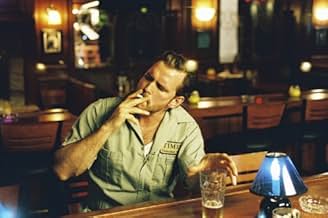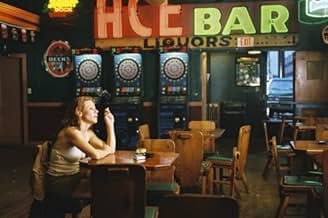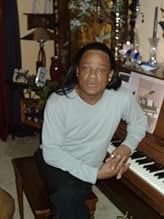This drama centers on Hank Chinaski, the fictional alter-ego of "Factotum" author Charles Bukowski, who wanders around Los Angeles, CA trying to live off jobs which don't interfere with his ... Read allThis drama centers on Hank Chinaski, the fictional alter-ego of "Factotum" author Charles Bukowski, who wanders around Los Angeles, CA trying to live off jobs which don't interfere with his primary interest, which is writing. Along the way, he fends off the distractions offered b... Read allThis drama centers on Hank Chinaski, the fictional alter-ego of "Factotum" author Charles Bukowski, who wanders around Los Angeles, CA trying to live off jobs which don't interfere with his primary interest, which is writing. Along the way, he fends off the distractions offered by women, drinking and gambling.
- Awards
- 4 wins & 5 nominations total
- Tony Endicott
- (as Tom Lyons)
- Stripper
- (as Emily 'Sophia Simone' Hynnek)
- Director
- Writers
- All cast & crew
- Production, box office & more at IMDbPro
Featured reviews
Essentially, this film is about the despairs of alcoholism, frighteningly brought to life by an array of simply stunning performances. Matt Dillon as Henry Chinasky is literally sweating alcohol. His face is red and swollen, he looks absolutely horrible. Once handsome but now an absolute has-been, who's sole interests are booze, gambling, sex and writing. People don't interest him at all, including the women, sex is all that interests him, if only mildly. Lily Taylor is a perfect match as his female interest and fellow barfly. But the real kudos are for Marisa Tomei in a relatively minor role but she really burns off the screen, alcohol set on fire. A real treat.
It might not be a typical Bukowski-movie, in the sense of his sometimes brash, aggressive, perhaps even typical direct American style, so fans of his work might judge this movie very differently and perhaps argue this is not the real spirit of Bukowsky put to the screen. But director Hamer handles it with such warmth, humor, sly wit and at times very sharp observations that you really shouldn't care about this. Judge it on its own merits.
Camera Obscura --- 9/10
Those episodes are all we get, and apart from brief writing and longer romantic interludes, they mainly concern a long round of short-lived jobs -- sorting pickles in a pickle factory, boxing brake shoes, dusting statues, driving a cab (a hard-on's no danger to the driver, the instructor says, but sneezing is), assembling bike parts, and so on, from which Hank is unfailingly soon fired for drunkenness or lateness, insubordination or other misdemeanors -- whereupon he goes back to writing, drinking, and sex -- which latter, Jan tells him, is no good when he gets successful as he does for a while playing the horses. (There's none of the post office sorting job Bukowski did for a long time.) For Bukowski and his alter ego being a seedy loser is a thing carried off with such chutzpah that it's sexy -- and drinking and sex are equally close ways to feed the libido. There are plenty of the ten-cent aphorisms the tireless writer worked at, and there's a plug for the Black Sparrow Press that eventually started to keep and publish his endlessly mailed out submissions and today still survives off maintaining the slob genius' ovre in public hands.
Bokowski appeals to the young, the easily impressed, the hard drinking, and those who like the pithy sayings and ignore the arrested development. For those of bourgeois mentality and upbringing there's a certain imperishably tonic thrill in watching a man who's been down so long it looks like up; who can tell the employer who's just fired him to give him his severance check immediately so he can hurry up and get drunk; for whom no flophouse or flat is too seedy, no bibulous girlfriend a worse drunk than he. How liberating it might be not to care about losing everything, knowing that since paper and pen are nearly free you'll never stop writing: or if you lose heart for a minute or two, a dip into the works of some other writer will encourage you in the belief that you can do better. Bokowski was a tough one.
Matt Dillon is Irish enough to have seen something of the hard drinking life himself. One senses that he knows whereof he speaks and can convey the alcoholic lifestyle without irony or melodrama. There's nothing quite like Lili Taylor coming out in her underwear to fix Hank a meal. His request is for another round of pancakes. "There's still no butter," she says. "Well, they'll be extra crisp," he replies.
In a smaller but still choice role Marisa Tomei is well disguised as another drunken lady Hank goes home with, finding that she lives with a flaky French millionaire called Pierre (Didier Flamand) with a little yacht and dreams of composing an opera. Hank's been taken off so many two bit jobs being fired has no sting left for him. Bukowski's persona is impenetrable and he's a simple survivor: he's almost utterly resistant to the forces of change his wayward lifestyle would activate in lesser beings and hence, unlike the downward spiraling drunk so movingly played by Nick Cage in Leaving Las Vegas, Bukowski's Hank in Dillon's performance cannot build toward pathos or true depth. As suggested, this film doesn't develop its sequences and relationships as thoroughly as Barfly, for which Bukowski himself wrote the screenplay, giving it a continuity and focus Factotum's more cobbled-together script doesn't quite muster.
There's something condescending and cultish in the European cultivation of the Bukowski myth in which this is another short chapter. Factotum is an occasionally amusing, at moments laugh-out-loud kind of movie that's well served by all the principals and by director Hamer's dry wit and restraint, but after the desultory and boring stretches have eventually started to pile up you may begin to say: So what? and wish the fresh novel feel of the early scenes could've been better sustained throughout. Not to fault the editing, but mightn't a native's keener ear for the rhythms of the dialogue have kept the flow going better? This is one to see if you like Matt Dillon or Bukowski; otherwise, save your time.
Henry Chinaski is made real by the always brilliant Matt Dillon. It really is no surprise that Hollywood's former pin-up embodies the part so well, as his perfected mix of sleaze and slack minded cool have made him the renowned actor he is. From 'Over the Edge' in 1979, the award winning 'Drugstore Cowboy' and his recent role as the scarred cop in 'Crash', Dillon really has the ability to expose man's flaws and run to a bar with them.
The film is spliced from various Bukowski writings and follows Chinaski (his alter-ego) around town as he drinks from job to job occasionally taking time to get fired and get laid. Lily Taylor and Marisa Tomei play two of Chinaski's bed-pals with equal sleaze and conviction.
This is not your usual movie in terms of subject matter and execution. It takes a Norwegian director, committed actors and a fantastic performance from Dillon to pull off a story that really is as much a Homage to Bukowski but also a bold attempt to deliver something different, a word not regularly accepted in today's Hollywood run industry. (Hence some of the finance coming from Japan).
From our introduction to Chinaski's routines of getting work and drinking; then losing work and drinking to watching what is essentially a horrible man (his treatment of woman, his lack of respect for anything) we are never really meant to like him. So why do we? It isn't just the looks or square jaw of the lead (Bukowski was the complete opposite) or his fantastic humorous charm but what lies beneath those eyes. Dillon has always been able to make the jerk likable. In this case, we do because he's funny and because we get a tiny glimpse of background reasoning why this man is so talented and yet so flawed. (The real Bukowski suffered a tough childhood and Chinaski's family is only referenced to in a hilarious scene of steak and ass- you'll see what I mean ).
Bent Hamer has accomplished a feat pretty standard in European film-making traditions- light comedy with black undertones outside of the rules of the usual three part formation. This tale could have started anywhere and ended anywhere in this man's life as the selling point it simply having Dillon on screen as this character- that is the story.
Bukowski was a genius who stuck to his loose morality with his back to society. It should be noted that he held down jobs for long periods, one for 12 years while doing what he did best, drinking and gambling but the only time he truly engaged was when he was observing for his writings, looking for funding i.e. work or needed a female drink buddy. He later had works published, hung around with Sean Penn (also considered for the role) and U2 dedicated a song to him.
The cast and crew have created a delightful fresh film that is both funny and dark. The performances are as authentic as ever with a mention going to Lily Taylor's career best performance. This film is a Jack of all trades and seems to have mastered a new one with the tone and atmosphere set perfectly to mirror the down and dirty LA Bukowski became part of.
As a whole the film just didn't capture the feel of the Bukowski novel. It seemed too clean for some reason. The whole film just seemed a lot more tame than the literature. His writing captures this great sense of adventure, danger, and a frequent raw vulgarity. But also, it has a very artful heart to it. The movie missed this entirely, in my opinion.
But believe it or not though, I still think it's a good movie. Outside the actual interpretation of Charles Bukowski's novel, it's still fun watch, with generally good performances, and a phenomenal story to have been based on.
Hank, like Bukowska is a dedicated alcoholic drifting indifferently through any odd jobs he can con his way into then disdainfully neglect until he is inevitably 'canned', spend the pay-off on booze and then ricochet randomly off to repeat the process elsewhere. It is as if, like the theory, through his alcoholic haze Hank sometimes has an idea of where he's going but isn't really clear where he actually is. Alternatively he sometimes has sense of where he is, but none at all of where he's going. Like a particle with no discernible fixed identity, he bounces randomly around the world colliding with people, places and events of which he is part, but in which he makes no stable intentional intervention and to which he displays no discernible interest. This process is constantly re-fuelled by a 24/7 intake of alcohol and nicotine. If this sounds incredible then we should remember that the real Bukowska's body survived this punishing regime for 74 years until his death in 1994.
If this were all, then Norwegian Director Bent Hamer's film would not be the absorbing work that it is. For through this fog of alcohol shines the dim light of Hank's determination to write. Not in the least for its rewards or recognition, but because it forms the nucleus of his fragile identity. And through the excellent use of Hank as narrator, the stark, clinical, austere quality of Bukowski's writing emerges. This is the poetry of skid row, the unsentimental, unflinching account of life at the margins of normal society about which Hank is entirely indifferent and Bukowsa himself viewed with contempt. There is a brief, doomed, flirtation with the idea that we might have some control over our destiny through Hank's initially successful foray into betting the horses. Racing I guess offers the illusion that even if God plays with dice, with a bit of determined effort a man might beat the odds. Of course this ends in failure - the house always wins in the end.
The paradox of quantum theory is that the precise and rigorous lucidity of the language of science, expresses a view of the world of matter that is devoid of certainty and inherently rests upon mere probabilities. Similarly Hank's island of lucidity is the drive to write; to create a meaningful response to a meaningless world. His behaviour is as random and unpredictable as the chaotic, senseless events of the world that provoke it. Yet an urge to coherence emerges through his irresistible drive to write about that world. He has simple appetites: alcohol, nicotine and sex and no moral, emotional scruple gets in the way of satisfying them. He is drawn into transitory friendships and fragile sexual relationships by the basic need to drink, smoke and have sex. The only relationship he has with any semblance of continuity and personal satisfaction is with fellow alcoholic Jan.They share these basics needs and arrive at a kind a stable modus vivendi where they are fully met without having to wander about the world hoping to pick them up in a run down bar. Jan's predilection for leaping into bed with every random bum she takes a fancy to, the dirtier the better, eventually fractures this sex-of-convenience arrangement. Here Hank packs his bag and leaves with the air of a guy popping out for a night's bowling rather than walking away from the only half-way stable relationship he's ever had. This fictional account mirrors Bukowska's own 10 year relationship with Janet Cooney-Baker also a long-term alcoholic who eventually lost her fight with the booze in 1962.
Hank lives in a down-beat, dead-beat world where his holy trinity of physical appetites are the only distraction from that world to which he is always, by choice, an outsider. The film is visually and aurally dark in tone. Yet through this, Hamer's screenplay, leaning I suspect heavily on Bukowska's own writing, cuts clinically and strikingly like a surgeon's knife making an incision to open up to the unflinching eye, the diseased or damaged part of life that may need surgical repair or excision. This is writing honed to a razor-sharp edge that is simply startling and despite inducing a sense of recoil, exercises a strange fascination. If I have a regret, it is that more might have been made of the occasional moments of darkly ironic humour flashing like flinty sparks out of the sheer absurdity of the many irredeemably hopeless situations Hank stumbles into. I don't now Bukowska's work but occasionally in this film Hank's blurred perspective seems to be a weary "so what?" in response to the world: at others there is a flash of rebellion that engages us much more.If there is much of Hank Chinaski to like we find it here.
Matt Dillon is a revelation and has never for my money done anything remotely in this league before. Lili Taylor is equally convincing as bed and bottle-mate Jan and even manages to tease a kind of pathetic tenderness out of the role. Marisa Tomei is effective as one of Hank's random, ricochet lays who is locked into a very weird foursome with two female friends and an older man who manipulates sex from all three by funding their booze and basic needs.
Factotum is no nice night out at the movies. Its darkness is as heavy as it context would imply. Yet it is constantly absorbing and thought-provoking. It is immensely successful in portraying the world and experience of an autobiographical character based upon a writer both Jean Genet and Jean-Paul Sartre called "America's greatest poet" This 'factotum', jack-of-all-trades, late in his writing life, by all accounts became master of one. Off-the-wall, in-the-gutter but cinematically on-the-money.
Zettel
Did you know
- TriviaOn 14 April 2005, in Trondheim, Norway, this became the first movie in the world to be shown with a 4K digital cinema projector.
- GoofsThe title screen displays: "factotum [a man who preforms many jobs]"--should be "performs many jobs".
- Quotes
[last lines]
Henry Chinaski: [voiceover] If you're going to try, go all the way. Otherwise don't even start. This could mean losing girlfriends, wives, relatives, jobs, and maybe your mind. It could mean not eating for three or four days. It could mean freezing on a park bench. It could mean jail. It could mean derision. It could mean mockery, isolation. Isolation is the gift. All the others are a test of your endurance. Of how much you really want to do it. And you'll do it, despite rejection in the worst odds. And it will be better than anything else you can imagine. If you're going to try, go all the way. There is no other feeling like that. You will be alone with the gods. And the nights will flame with fire. You will ride life straight to perfect laughter. It's the only good fight there is.
- SoundtracksI Wish to Weep
Lyrics by Charles Bukowski
Music by Kristin Asbjørnsen
Performed by Dadafon
Mixed by Magnus Torkildsen at Barracuda
- How long is Factotum?Powered by Alexa
Details
- Release date
- Countries of origin
- Language
- Also known as
- Factotum: A Man Who Performs Many Jobs
- Filming locations
- Production companies
- See more company credits at IMDbPro
Box office
- Budget
- $1,000,000 (estimated)
- Gross US & Canada
- $808,221
- Opening weekend US & Canada
- $59,212
- Aug 20, 2006
- Gross worldwide
- $2,708,087
- Runtime1 hour 34 minutes
- Color
- Sound mix
- Aspect ratio
- 1.85 : 1
Contribute to this page






























